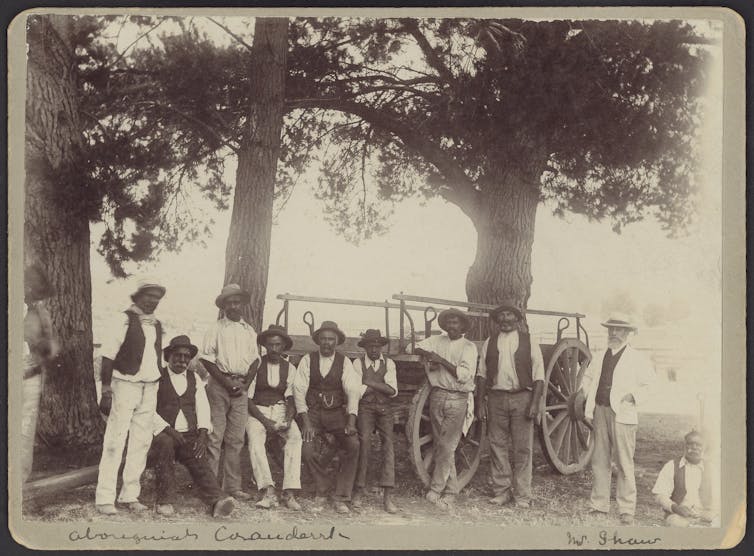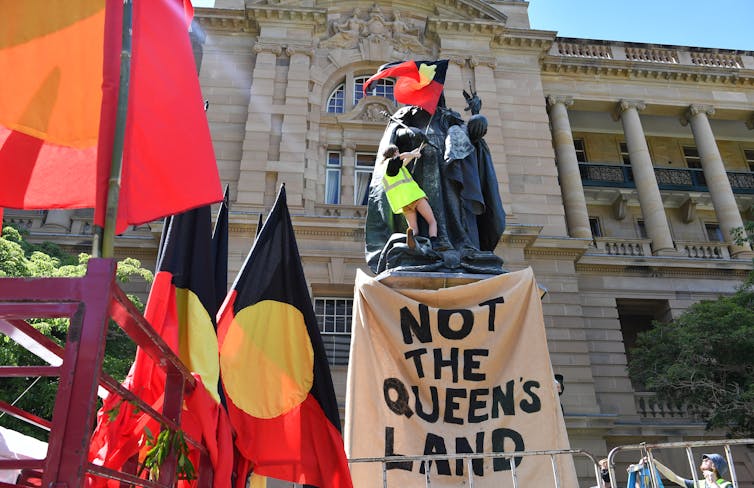to move forward, we need to answer for the legacies of colonisation
- Written by Harry Hobbs, Lecturer, University of Technology Sydney
Last year, the Victorian government announced it would establish a Truth and Justice process to “recognise historic wrongs and address ongoing injustices for Aboriginal Victorians”.
Since then, the government has worked in partnership with the First Peoples’ Assembly to figure out how that process would operate.
Today, the government and the First Peoples’ Assembly co-chairs announced the process would be run by the Yoo-rrook Justice Commission (named for the Wemba Wemba/Wamba Wamba word for “truth”). The commission will be led by five commissioners and, importantly, will be invested with the powers of a royal commission.
The announcement was made at Coranderrk, a former Aboriginal reserve outside Melbourne. The site is significant. Dispossessed from their country, a group of Aboriginal people were allowed in the 1860s to settle on a small parcel of land deemed unsuitable for agriculture.
Rebuilding their community, the group farmed and sold produce into Melbourne. Their success caused resentment among non-Indigenous farmers and the Aboriginal Protection Board.
In 1886, after many years of increasing pressure from the board, residents issued the Coranderrk Petition to the Victorian government, protesting the heavy restrictions that had been placed on their lives. Their petition went unanswered. Residents were evicted, and the land was eventually reclaimed by the government.
The Coranderrk Petition is one example of how Aboriginal and Torres Strait Islander communities actively resisted colonisation. It also shows governments can — and often do — act in ways that caused deep injustices. It is these, and many other events, that have motivated calls for truth in the present day.
 The Aboriginal resistance in Coranderrk is considered one of the first Indigenous campaigns for land rights and self-determination in the country.
State Library of Victoria
The Aboriginal resistance in Coranderrk is considered one of the first Indigenous campaigns for land rights and self-determination in the country.
State Library of Victoria
What are truth commissions?
Truth commissions reflect the idea that there can be “no justice without truth”.
Aboriginal and Torres Strait Islander peoples have often made this connection. For example, in the Adelaide Regional Dialogue, which preceded the First Nations Constitutional Convention (and the Uluru Statement from the Heart) in 2017, participants agreed
we want the history of Aboriginal people taught in schools, including the truth about murders and the theft of land, Maralinga, and the Stolen Generations, as well the story of all the Aboriginal fighters for reform. Healing can only begin when this true history is taught.
Truth commissions have been set up in many countries around the world as a means to investigate and redress past human rights abuses. Since the first commission began in 1974, at least 40 national truth commissions have been established.
The most prominent truth commission is the South African Truth and Reconciliation Commission. Set up to investigate human rights abuses committed under apartheid, the commission’s hearings were broadcast live to a captivated nation. Controversially, however, the commission could grant amnesty to perpetrators who confessed to their crimes.
Another example comes from Canada. In 2008, the Canadian Truth and Reconciliation Commission began documenting the history and legacy of the country’s notorious residential schools system, which operated from 1878–1996.
Under this system, First Nations children were forcibly removed from their homes and families and put into boarding schools run by the government and churches. Similar to the Stolen Generations in Australia, the government had a mission “to kill the Indian in the child”, according to a national apology by then-Prime Minister Stephen Harper in 2008.
Concluding in 2015, the commission issued 94 “calls to action” to redress the legacies of the school system and advance the process of Canadian reconciliation.
Why an Australian truth commission is unique
The South African and Canadian truth commissions are valuable examples, but the process in Victoria will need to be designed differently. Thankfully, the government has acknowledged this.
Two points stand out. First, truth commissions are often set up by a new government to investigate human rights abuses under a previous regime.
However, this isn’t comparable to the abuses suffered by Aboriginal and Torres Strait Islander peoples. Although the invasion and massacres happened many years ago, the consequences of colonisation continue to this day. This fact was recognised by the Royal Commission into Aboriginal Deaths in Custody in 1991, which said,
so much of the Aboriginal people’s current circumstances, and the patterns of interactions between Aboriginal and non-Aboriginal society, are a direct consequence of their experience of colonialism and, indeed, of the recent past.
In Australia, a truth-telling process should not simply document history and investigate “historic abuses”. Rather, it should serve as a bridge to “draw history into the present”.
 The legacy of colonisation continues to be felt — and contested — across Australia today.
Darren England/AAP
The legacy of colonisation continues to be felt — and contested — across Australia today.
Darren England/AAP
Second, truth commissions often focus on individual human rights violations.
This also might not be appropriate in Australia, where many perpetrators of violence are likely to have died. More importantly, Indigenous peoples see little distinction between individual acts of violence, such as massacres, and the broader structural forces behind the laws, policies and attitudes that gave rise to and encouraged such violence.
A truth-telling process can help to identify those connections for non-Indigenous Australians.
Read more: Friday essay: it's time for a new museum dedicated to the fighters of the frontier wars
How Victoria’s inquiry can be a model for the nation
The Victorian announcement places more pressure on the Commonwealth government to implement the Uluru Statement. After all, the call for truth and justice is made by all Aboriginal and Torres Strait Islander peoples, not just those in Victoria.
The Uluru Statement called for three steps to empower Aboriginal and Torres Strait Islander peoples:
putting a First Nations Voice in the Australian Constitution
the establishment of a Makarrata Commission that would oversee a process of agreement-making and then a process of truth-telling.
Voice. Treaty. Truth.
The Victorian government shows this sequenced reform process can work. The First Peoples’ Assembly in the state worked with the government to develop the Yoo-rrook Justice Commission. That commission and the truth-telling process will guide the push for treaties between Aboriginal communities and the state.
The Commonwealth government initially rejected the call for a First Nations Voice. Although its opposition has softened, it remains reluctant to put the Voice in the constitution.
This is concerning. Without constitutional entrenchment, the Voice is likely to struggle to be effective and a national process of treaty making and truth-telling may not occur. Further, a national First Nations Voice will be unable to protect important developments at the state level, like those in Victoria.
Challenges remain, but the announcement today is significant. As First Peoples’ Assembly co-chair Marcus Stewart noted,
never before have we seen a truth-telling process in this country or state.
Authors: Harry Hobbs, Lecturer, University of Technology Sydney



















